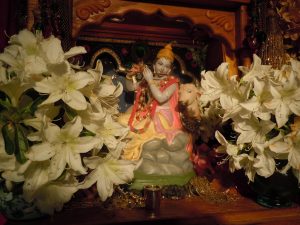Two different approaches to living in the material world
both real but each contradictory to the other.
TQK Ch 26….
The letter pa is for pariśrama, which means “labor.” In this material world, one must work very hard to maintain oneself. In Bhagavad-gītā (3.8) it is said, śarīra-yātrāpi ca te na prasiddhyed akarmaṇaḥ: “one cannot even maintain one’s own body without work.” Kṛṣṇa never advised Arjuna, “I am your friend, and I shall do everything. You just sit down and smoke ganja Kṛṣṇa was doing everything, but still He told Arjuna, “You must fight.” Nor did Arjuna say to Kṛṣṇa, “You are my great friend. Better for You to fight and let me sit down and smoke ganja. No, that is not Kṛṣṇa consciousness. A God conscious person does not say, “God, You please do everything for me and let me smoke ganja” Rather, a God conscious person must work for God. But even if one does not work for the sake of God, one must work, for without work one cannot even maintain one’s body. This material world, therefore, is meant for pariśrama, hard labor.
Even a lion, although king of the beasts, must still look for its own prey in the jungle. It is said, na hi suptasya siṁhasya praviśanti mukhe mṛgāḥ. A lion cannot think, “Since I am king of the forest, let me sleep, and all the animals will come into my mouth.” That is not possible. “No, sir. Although you are a lion, you must go search for your food.” Thus even the lion, although so powerful, must endeavor with great difficulty to find another animal to eat, and similarly everyone in this material world must work with great difficulty to continue his life.
SB 7.15.15
Even if a man is poor, he should not endeavor to improve his economic condition just to maintain his body and soul together or to become a famous religionist. Just as a great python, although lying in one place, not endeavoring for its livelihood, gets the food it needs to maintain body and soul, one who is desireless also obtains his livelihood without endeavor.
PURPORT-Human life is simply meant for developing Kṛṣṇa consciousness. One need not even try to earn a livelihood to maintain body and soul together. This is illustrated here by the example of the great python, which lies in one place, never going here and there to earn a livelihood to maintain itself, and yet is maintained by the grace of the Lord. As advised by Nārada Muni (Bhāg. 1.5.18), tasyaiva hetoḥ prayateta kovidaḥ: one should simply endeavor to increase his Kṛṣṇa consciousness. One should not desire to do anything else, even to earn his livelihood. There are many, many examples of this attitude. Mādhavendra Purī, for instance, would never go to anyone to ask for food. Śukadeva Gosvāmī has also said, kasmād bhajanti kavayo dhana-durmadāndhān. Why should one approach a person who is blind with wealth? Rather, one should depend on Kṛṣṇa, and He will give everything. All the members of our Kṛṣṇa consciousness movement, whether they be gṛhasthas or sannyāsīs, should try to spread the Kṛṣṇa consciousness movement with determination, and Kṛṣṇa will supply all necessities. The process of ājagara-vṛtti, the means of livelihood of a python, is very much appreciated in this regard. Even though one may be very poor, he should simply try to advance in Kṛṣṇa consciousness and not endeavor to earn his livelihood.

Some Conclusions—In these two verses and purports, Srila Prabhupada is trying to show us two different ways to live in this world. For the materialist, he has to work, is forced to work by the impulses of material nature and his bad past karma. But for the spiritualist, (like the python) he is more inclined to just work enough to keep body and soul together.
To the materialistic person this no working atttude seems to be lazy, but in the larger view of life, no matter how much one works, he has to leave it all behind him-even his so called name and fame, for who will remember what we accomplished when everyone is dead and gone from that time? Prabhupada often mentions the ruins of Rome and how one can today see the vestiges of a once great empire. But he says, where are those people today? Nobody asks that.
All we see today is a large pile of rocks that look like once it was a great building or a palace. But the people who built them-where did they go? What was their destination? They were all spirit souls, and had to go somewhere. Isnt that the most important question? Not who built this place?
So the same applies to ourselves, our spouses, our families, our communities, nations. All finished in a flick of eternal time. We go somewhere else and it all stays here.
Hare Krsna
damaghosa das



